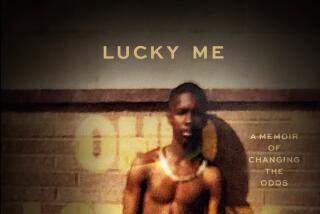After Going for Jugular, Licenser Sticks His Neck Out
- Share via
Michael Lajtay plucked the word “jugular” from the air and then started building a business around it.
The Huntington Beach resident figured the word’s go-for-the-throat imagery would appeal to the thrill-seeking extreme sports crowd. So he plunged into the hotly competitive $115-billion licensing industry, forming Jugular Inc., creating an eye-popping logo and making plans to plaster the trademarked Jugular name on everything from toys to taco sauce.
Lajtay, 33, has signed licensing deals for Jugular watches, a Jugular video game, Jugular lighters, key chains and trading cards, among others. In the first three months this year, the company has logged $328,500 in advance payments and royalty guarantees, said Lajtay, who provided copies of some of the contracts.
The key test, however, still looms--whether consumers will snap up the products or whether retailers will even want them on their already bulging shelves.
“It’s doubtful,” said Paul Epner, president of International Licensing Corp., owner of the 40-year-old Hang Ten apparel brand, which has been licensed for decades.
Still, industry experts say licensing offers companies an opportunity to do business with relatively low overhead. And people are increasingly turning to licensing to launch, expand and even rescue their businesses.
Indeed, Irvine apparel designer Mossimo Inc. may have saved its business recently by striking a licensing deal with Target Stores, which next year will become the only stores selling Mossimo sports apparel. That deal was brokered by executives at Cherokee Inc., a Van Nuys company that began licensing its brands a few years ago to lift itself out of bankruptcy.
Cherokee, which once had hundreds of employees, now has about 14. Jugular founder Lajtay works from his home, managing without so much as a secretary.
Experts also cite another factor in Jugular’s favor--the company’s strategy of honing in on a relatively untapped market, extreme sports, with great growth potential.
“[Extreme sports] is a huge market,” said Carol Knops, with Bradford Licensing, whose clients include Pepsi, Mountain Dew and Kawasaki. “And he’s got a name that people can identify with.”
Jugular sponsors three top athletes in two nerve-tingling sports--street luge racing and downhill skateboarding. The athletes appear on the internationally televised X-Games and Gravity Games, with “Jugular” on the leg of their pants.
“By doing that, he’s making people assume there’s product attached to that brand,” said Marty Brochstein, executive editor of the Licensing Letter in Manhattan. “And lo and behold, somebody will license the product that everybody assumes is already there.”
Companies that have agreed to make and distribute products bearing the Jugular label say they did so to gain entree into the extreme sports market.
“We’re the type of company that looks for new genres and tries to exploit them,” said Andy Koehler, manager of licensing for HeadGames Publishing, which has made a Jugular Street Luge Racing computer game that will sell for about $20 in stores such as Wal-Mart, Kmart, Target and Toys R Us. HeadGames is a subsidiary of game maker Activision Inc. in Santa Monica.
Despite the myriad of licensing ventures, industry experts say it is unusual for someone to simply pick a name, register it in a broad array of product categories and then immediately start licensing it out without first having a known product.
“Everybody in the industry knows that licensing is an after-market product,” said Gerald Eyrich, a retired economics professor who pitched in $60,000 to help Lajtay start his company. “He’s done things you can’t do.”
Lajtay is a one-man publicity department with the tenacity of a pit bull. He owns 85% of his company and has brought aboard 47 shareholders.
“He’s very ambitious and very focused,” said Theresa Andreoli, senior retail editor for License magazine. “But we have to wait till retail to see if it’s going to go someplace.”
A native of Queens, N.Y., Lajtay moved to Orange County in the late 1970s. He attended Ocean View High School in Huntington Beach before heading for Claremont McKenna College to earn his degree in economics.
Initially, Lajtay helped companies develop business plans and raise money, rounding up investors who poured in millions of dollars.
But by the time he turned 29, Lajtay was disappointed in himself, figuring he should be running his own company. “Everyone was getting wealthy but me,” he said.
Convinced he could mine the extreme sports craze, Lajtay came up with the Jugular name and had a logo designed. Then, he contacted Eyrich, the economics professor, who agreed to be the first financial backer in 1996.
Two years later, Lajtay had his first licensing deal and Jugular generated sales of about $70,000. Sales jumped to about $340,000 last year, he said, including guarantees of future payments and $40,000 in stock warrants.
As the business grows, however, it will be bumping up against the heavy hitters, established businesses that employ bulldozing marketing machines.
For example, a line of Jugular sunglasses that Lajtay plans to launch later this year would compete with Foothill Ranch-based Oakley Inc., which targets the same consumers and yawns at the prospect of yet another sunglass maker entering the market.
“[New companies are] constantly popping up,” Oakley spokesman Lance Allega said. “And they’re gone in six months.”
Considering such obstacles, even Eyrich has trouble predicting exactly where Jugular is headed.
“I don’t think Jugular’s ever going to be a Nike, not even a Mossimo,” he said. “But there’s a definite niche there, and in that niche, I think he’s going to be extremely successful.”
(BEGIN TEXT OF INFOBOX / INFOGRAPHIC)
Going for the Dollars
Worldwide sales of licensed merchandise have grown 11% in the last five years. Year-by-year sales:
*--*
95: $103.8 billion 96: 109.5 billion 97: 112.4 billion 98: 111.8 billion 99: 115.4 billion
Source: The Licensing Letter
More to Read
Inside the business of entertainment
The Wide Shot brings you news, analysis and insights on everything from streaming wars to production — and what it all means for the future.
You may occasionally receive promotional content from the Los Angeles Times.










